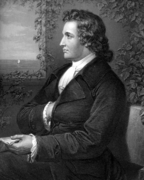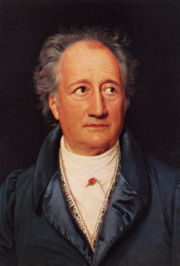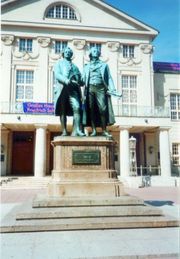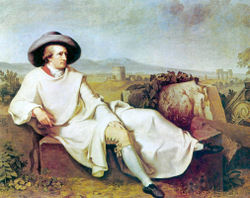Johann Wolfgang Goethe
2007 Schools Wikipedia Selection. Related subjects: Writers and critics
| Johann Wolfgang Goethe | |
|---|---|
|
Johann Wolfgang Goethe
|
|
| Born | 28 August 1749 Frankfurt, Germany |
| Died | 22 March 1832 Weimar, Germany |
Johann Wolfgang Goethe , IPA: [gøːtə], later von Goethe, ( 28 August 1749 – 22 March 1832) was a German polymath: he was a poet, novelist, dramatist, humanist, scientist, theorist, painter, and for ten years chief minister of state for the duchy of Weimar.
Goethe was one of the key figures of German literature and the movement of Weimar Classicism in the late 18th and early 19th centuries; this movement coincides with Enlightenment, Sentimentality ("Empfindsamkeit"), Sturm und Drang, and Romanticism. The author of Faust and Theory of Colours, he inspired Darwin with his independent discovery of the human intermaxillary jaw bones and focus on evolutionary ideas. Goethe's influence spread across Europe, and for the next century his works were a primary source of inspiration in music, drama, poetry, and philosophy. He is widely considered to be one of the most important thinkers in Western culture, and is often cited as one of history's greatest geniuses.
Life
Early life (1749–1765)
Goethe's father, Johann Caspar Goethe (1710–1782), lived with his family in a large house in Frankfurt am Main, then part of the Holy Roman Empire. Goethe's mother, Catharina Elisabeth Textor (1731–1808), the daughter of the Mayor of Frankfurt, married 38-year-old Johann Caspar when she was only 17. All their children, except for Goethe and his sister, Cornelia Friderike Christiana, who was born in 1750, died at an early age.
Johann Caspar and private teachers gave Goethe lessons in all common subjects, especially languages (Latin, Greek, French, English and Hebrew). Goethe also took lessons in dancing, riding and fencing. He had a persistent dislike of the church, and characterized its history as a "hotchpotch of mistakes and violence" {Mischmasch von Irrtum und Gewalt). His great passion was drawing. Goethe quickly became interested in literature; Friedrich Gottlieb Klopstock and Homer were among his early favourites. He had a lively devotion to theatre as well, and was greatly fascinated by puppet shows that were annually arranged in his home –- a familiar theme in Wilhelm Meister.
Leipzig (1765-1768)
Goethe studied law in Leipzig from 1765 to 1768. Learning age-old judicial rules by heart was something he strongly detested. He preferred to attend the poetry lessons of Christian Fürchtegott Gellert. In Leipzig, Goethe fell in love with Käthchen Schönkopf and wrote cheerful verses about her in the Rococo genre. In 1770, he anonymously released Annette, his first collection of poems. His uncritical admiration for many contemporary poets vanished as he became interested in Lessing and Wieland. Already at this time, Goethe wrote very much – he threw away nearly all of these works, except for the comedy Die Mitschuldigen. The restaurant Auerbachs Keller and its legend of Faust’s 1525 barrel ride impressed him so much that Auerbachs Keller became the only real place in his drama Faust Part One. Because his study did not advance, Goethe was forced to return to Frankfurt at the end of August 1768.
Frankfurt/Strasbourg (1768-1770)
In Frankfurt, Goethe became severely ill. During the year and a half which followed, because of several relapses, the relationship with his father worsened. During convalescence, Goethe was nursed by his mother and sister. Bored in bed, he wrote an impudent crime comedy. In April 1770, his father lost his patience; Goethe left Frankfurt in order to finish his studies in Strasbourg.
In Alsace, Goethe blossomed. No other landscape has he described as affectionately as the warm, wide Rhine area. In Strasbourg, Goethe met Johann Gottfried Herder, who happened to be in town on the occasion of an eye operation. The two became close friends, and crucially to Goethe's intellectual development, it was Herder who kindled his interest in Shakespeare, Ossian, and in the notion of Volkspoesie (folk poetry). On a trip to the village Sesenheim, Goethe fell in love with Friederike Brion. But after a couple of weeks, he ended the relationship. Several of his poems, like Willkommen und Abschied, Sesenheimer Lieder and Heideröslein, originate from this time.
Despite being based on own ideas, his legal thesis was published uncensored. Shortly after, he was offered a career in the French government. Goethe rejected – he did not want to commit himself, but to remain an "original genius".
Frankfurt and Darmstadt (1771)
At the end of August 1771, Goethe was certified as licensee in Frankfurt. He wanted to make the jurisdiction progressively more humane. In his first cases, he proceeded too vigorously, was reprimanded and lost the passion. This prematurely terminated his career as a lawyer after only a few months. At this time, Goethe was acquainted with the court of Darmstadt, where his inventiveness was praised. From this milieu came Johann Georg Schlosser (who was later to become his brother-in-law) and Johann Heinrich Merck. Goethe also pursued literary plans again; this time, his father did not have anything against it, and even helped. Goethe got hands on the biography of a noble highwayman from the Peasants' War. In a couple of weeks, the biography was converted into a colourful picture book. The work, called "Götz von Berlichingen", went straight to the heart of his contemporaries.
Professional and later life (1772-1832)
Goethe could not subsist on being one of the editors of a literary periodical (published by Schlosser and Merck). In May 1772, he once more began the practice of law at Wetzlar. At the invitation of Carl August, Grand Duke of Saxe-Weimar-Eisenach, he went, in 1775, to live in Weimar where he held a succession of political offices, even becoming the Duke's chief adviser.
Study of the Qur'an
His first Qur'an studies of 1771/1772 and the later ones are in the Goethe and Schiller-Archive in Weimar. Goethe read the German translation of Qur'an by J. v. Hammer (possibly as well the more prosaic English translation of G. Sale) aloud in front of members of the Duke's family in Weimar and their guests. Being witnesses, Schiller and his wife reported about the reading. Goethe always felt that the contemporaneous (Latin, English, German and French) translations had shortcomings and was constantly looking for new translations.
Goethe bought original Persian manuscripts of Rumi, Jami, Hafiz, Saadi, Attar, Tafsir al-Tabari, Dua, an Arabic-Turkish dictionary, and texts on matters like the freeing of slaves, buying and selling, interest, usury and Arabian scripts from Sultan Selim. Goethe's positive attitude towards Islam goes far beyond anyone in Germany before. On 24 February 1816, he wrote, "The poet [Goethe]... does not refuse the suspicion that he himself is a Muslim." Goethe was mostly attracted by the religious and philosophical meaning of Islam -- the unity of God and the conviction that God manifests in nature and creation are some of the major themes in Goethe's work. In 1771/1772, Goethe copied and partly corrected the text of the first direct translation of the Qur'an from Arabic into German.
Later life
He was ennobled in 1782. His journey to the Italian peninsula from 1786 to 1788 was of great signicance for his later aesthetical and philosophical development, as was his admission in 1782 that he was "a decided non- Christian". His diaries of this period form the basis of the non-fiction Italian Journey. In the autumn of 1792, Goethe took part in the battle of Valmy against revolutionary France, assisting Duke Carl August of Saxe-Weimar during the failed invasion of France. In 1794 Friedrich Schiller wrote to Goethe offering friendship, which lasted until the former's death in 1805; they had previously had a wary acquaintance since 1788. In 1806, he married Christiane Vulpius. By 1820, he was on friendly terms with Kaspar Maria von Sternberg. From 1794, he devoted himself chiefly to literature and after a life of immense productivity, died while in Weimar, in 1832.
Works
The most important of Goethe's works produced before he went to Weimar were his tragedy Götz von Berlichingen (1773), which was the first work to bring him fame, and the novel The Sorrows of Young Werther (1774), which gained him enormous popularity as a writer in the Sturm und Drang movement. During the years at Weimar before he met Schiller he began Wilhelm Meister, wrote the dramas Iphigenie auf Tauris (Iphigenia in Tauris), Egmont, Torquato Tasso, and Reineke Fuchs.
To the period of his friendship with Schiller belong the continuation of Wilhelm Meister, the idyll of Hermann and Dorothea, and the Roman Elegies. In the last period, between Schiller's death, in 1805, and his own, appeared Faust, Elective Affinities, his pseudo-autobiographical Aus meinem Leben: Dichtung und Wahrheit (From my Life: Poetry and Truth), his Italian Journey, much scientific work, and a series of treatises on German art. His writings were immediately influential in literary and artistic circles.
In addition to his literary work, Goethe also contributed significant work to the sciences. In biology, his theory of plant metamorphosis stipulated that all plant formation stems from a modification of the leaf; during his Italian journey (1786-1788), in July of 1787, he writes as the first indication of this idea:
Furthermore I must confess to you that I have nearly discovered the secret of plant generation and structure, and that it is the simplest thing imaginable.... Namely it had become apparent to me that in the plant organ which we ordinarily call the leaf a true Proteaus is concealed, who can hide and reveal himself in all sorts of configurations. From top to bottom a plant is all leaf, united so inseparably with the future bud that one cannot be imagined without the other.
—Suhrkamp ed., vol 6; trans. Robert R Heitner, Italian Journey
He is credited with the discovery of the intermaxillary bone in humans, during 1784; however, Broussonet (1779) and Vicq d'Azyr (1780) had identified the same structure several years earlier.
Although it was never well received by scientists due to its apparent conflict with Newton's theory of light, against which Goethe fulminated, Goethe considered his Theory of Colours to be his most important work. Although much of his position within this field is often blurred by misconceptions among both his detractors and eulogizers, based upon his experiments with prismatic colors Goethe characterized colour as arising from the dynamic interplay of darkness and light, and standing between their polar qualities:
...they maintained that shade is a part of light. It sounds absurd when I express it; but so it is: for they said that colours, which are shadow and the result of shade, are light itself, or, which amounts to the same thing, are the beams of light, broken now in one way, now in another.
He also regarded light's physical nature, physiological effects (including the afterimages induced in the eye), and psychological effects as interrelated phenomena. In the twentieth century, Goethe's Theory of Colours influenced the philosopher Ludwig Wittgenstein's Remarks on Colour, Werner Heisenberg and Max Planck have indicated the accuracy and suggestiveness of many of Goethe's scientific statements, and it has had a tremendous impact in other fields.
Key works
The following list of key works may give a sense of the scope of the impact his work had on his and modern times.
The short epistolary novel, Die Leiden des jungen Werthers, or The Sorrows of Young Werther, published in 1774, recounts an unhappy love affair that ends in suicide. Goethe admitted that he "shot his hero to save himself". The novel remains in print in dozens of languages and is frequently referred to in the context of a young hero, who becomes disillusioned with society and by his irreconcilable love for a young woman. The fact that it ended with the protagonist's suicide and funeral—a funeral which "no clergyman attended"—made the book deeply controversial upon its (anonymous) publication, for it seemed to condone suicide. One would have expected a clergyman to attend the funeral service and condemn an act considered to be sinful by Christian doctrine. Epistolary novels were common during this time, letter-writing being people's primary mode of communication. What set Goethe's book apart from other such novels was its expression of unbridled longing for a joy beyond possibility, its sense of defiant rebellion against authority, and, above all, its total subjectivity—qualities that pointed the way toward the Romantic movement.
The next work, his epic closet drama Faust, was to be completed in stages, and only published in its entirety after his death. The first part was published in 1808 and created a sensation. The first operatic version, by Spohr, appeared in 1814, and was subsequently the inspiration for operas by Gounod, Boito, and Busoni, as well as symphonies by Liszt, Wagner, and Mahler. Faust became the ur-myth of many figures in the 19th century. Later, a facet of its plot, i.e., of selling one's soul to the devil for power over the physical world, took on increasing literary importance and became a view of the victory of technology and of industrialism, along with its dubious human expenses. On occasion, the play is still staged in Germany and other parts around the world.
Goethe's poetic work served as a model for an entire movement in German poetry termed Innerlichkeit ("introversion") and represented by, for example, Heine. Goethe's words inspired a number of compositions by, among others, Mozart, Beethoven, Schubert, Berlioz, and Wolf. Perhaps the single most influential piece is "Mignon's Song" which opens with one of the most famous lines in German poetry, an allusion to Italy: "Kennst du das Land, wo die Zitronen blühn?" ("Do you know the land where the lemons bloom?").
He is also widely quoted. Epigrams such as "Against criticism a man can neither protest nor defend himself; he must act in spite of it, and then it will gradually yield to him", "Divide and rule, a sound motto; unite and lead, a better one", and "Enjoy when you can, and endure when you must", are still in usage or are paraphrased. Lines from Faust, such as "Das also war des Pudels Kern", "Das ist der Weisheit letzter Schluss", or "Grau ist alle Theorie" have entered everyday German usage. Although a doubtful success of Goethe in this field, the famous line from the drama Götz von Berlichingen ("Er kann mich im Arsche lecken": "He can lick my arse") has become a vulgar idiom in many languages, and shows Goethe's deep cultural impact extending across social, national, and linguistic borders. It may be taken as another measure of Goethe's fame that other well-known quotations, such as Hippocrates' "Art is long, life is short", which is also found in his Wilhelm Meister, is usually forgotten to be originally associated with Hippocrates.
Eroticism
Many of Goethe's works depict homoerotic and generally erotic occurrences, such as in Wilhelm Meister, Faust, Götz von Berlichingen, the Roman Elegies, and the Venetian Epigrams, though these have often been explained away or ignored. This is partly due to how some in the past and to this day view sexuality and its nuances. For example, in 1999, Karl Hugo Pruys' book The Tiger's Tender Touch: The Erotic Life of Goethe caused national controversy in Germany when it formalized the possibility of Goethe's homosexuality, tentatively deduced from Goethe's writings, for mainstream debate. In actuality, however, the perennial sexual portraitures and allusions in his work may in fact stem from one of the many effects of his profoundly eye-opening sojourn in Italy, where men, who shunned the prevalence of women's venereal diseases and unconscionable conditions, embraced homosexuality as a solution that was not widely imitated outside of Italy. Whatever the case, Goethe clearly saw sexuality, in general, as a topic that merited poetical and artistic depiction which went against the thought of his time, when the very private nature of sexuality was rigorously enforced, and makes him appear much more modern and—in the terms of Weimar Classicism— Greek than he is typically thought to be.
Historical importance
It is very difficult to overstate the importance of Goethe on the 19th century. In many respects, he was the originator of—or at least the first to cogently express—many ideas which would later become familiar. Goethe produced volumes of poetry, essays, criticism, and scientific work, including a theory of optics and early work on evolution and linguistics. He was fascinated by minerals and early mineralogy (the mineral goethite is named for him). His non-fiction writings, most of which are philosophic and aphoristic in nature, spurred on the development of many philosophers, such as G.W.F. Hegel, Arthur Schopenhauer, Friedrich Nietzsche, Ernst Cassirer, Rudolf Steiner, and others, and of various literary movements, such as romanticism. He embodied many of the contending strands in art over the next century: his work could be lushly emotional, and rigorously formal, brief and epigrammatic, and epic. He would argue that classicism was the means to controlling art, and that romanticism was a sickness, even as he penned poetry rich in memorable images, and rewrote the formal rules of German poetry.
His poetry was set to music by almost every major Austrian and German composer from Mozart to Mahler, and his influence would spread to French drama and opera as well. Beethoven declared that a "Faust" Symphony would be the greatest thing for Art. Liszt and Mahler both created symphonies in whole or in large part inspired by this seminal work which would give the 19th century one of its most paradigmatic figures: Doctor Faustus. The Faust tragedy/drama, often called "Das Drama der Deutschen" (the drama of Germans), written in two parts published decades apart, would stand as his most characteristic and famous artistic creation.
Goethe was also a cultural force, and by researching folk traditions, he created many of the norms for celebrating Christmas, and argued that the organic nature of the land moulded the people and their customs—an argument that has recurred ever since, including recently in the work of Jared Diamond. He argued that laws could not be created by pure rationalism, since geography and history shaped habits and patterns. This stood in sharp contrast to the prevailing Enlightenment view that reason was sufficient to create well-ordered societies and good laws.
Influence
Goethe's influence was dramatic because he understood that there was a transition in European sensibilities, an increasing focus on sense, the indescribable, and the emotional. This is not to say that he was emotionalistic or excessive; on the contrary, he lauded personal restraint and felt that excess was a disease: "There is nothing worse than imagination without taste". He argued in his scientific works that a "formative impulse", which he said is operative in every organism, causes an organism to form itself according to its own distinct laws, and therefore rational laws or fiats could not be imposed at all from a higher, transcendent sphere; this placed him in direct opposition to those who attempted to form "enlightened" monarchies based on "rational" laws by, for example, Joseph II of Austria or, the subsequent Emperor of the French, Napoleon I. A quotation from his Scientific Studies will suffice:
We conceive of the individual animal as a small world, existing for its own sake, by its own means. Every creature is its own reason to be. All its parts have a direct effect on one another, a relationship to one another, thereby constantly renewing the circle of life; thus we are justified in considering every animal physiologically perfect. Viewed from within, no part of the animal is a useless or arbitrary product of the formative impulse (as so often thought). Externally, some parts may seem useless because the inner coherence of the animal nature has given them this form without regard to outer circumstance. Thus...[not] the question, What are they for? but rather, Where do they come from?
—Suhrkamp ed., vol 12, p. 121; trans. Douglas Miller, Scientific Studies
This change would later become the basis for 19th century thought—organic rather than geometrical, evolving rather than created, and based on sensibility and intuition, rather than on imposed order, culminating in, as he said, a "living quality" wherein the subject and object are dissolved together in a poise of inquiry. Consequently, he embraced neither teleological nor deterministic views of growth within every organism. Instead, the world as a whole grows through continual, external, and internal strife. Moreover, he did not embrace the mechanistic views that contemporaneous science subsumed during his time, and therewith he denied rationality's superiority as the sole interpretation of reality. Furthermore, he declared that all knowledge is related to humanity through its functional value alone and that knowledge presupposes a perspectival quality. He also stated that the fundamental nature of the world is aesthetic.
His views make him, along with Adam Smith, Thomas Jefferson, and Ludwig van Beethoven, a figure in two worlds: on one hand, devoted to the sense of taste, order, and finely crafted detail, which is the hallmark of the artistic sense of the Age of Reason and the neo-classicistic period of architecture; on the other, seeking a personal, intuitive, and personalized form of expression and polity, firmly supporting the idea of self-regulating and organic systems. Thinkers such as Ralph Waldo Emerson would take up many similar ideas in the 1800s. His ideas on evolution would frame the question which Darwin and Wallace would approach within the scientific paradigm.




